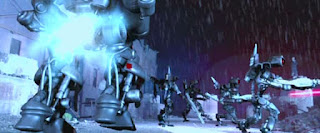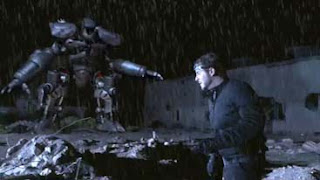(Updated 24.07.2023) Yet another title rip-off of a big-budget Hollywood release by The Asylum,
the infamous z-grade production company known for, well, making tacky
low-budget versions of big-budget Hollywood genre films. ("Mockbusters") At least in
title, Transmorphers tries hard to ride on the coattails of the success of Michael Bay's brainless and explosive Transformers (2007 / trailer) and, going by some entries on imdb, the strategy obviously works. (I.e.: "I only stumbled onto this movie after having mistaken it for Transformers. That was disappointment number one. Well, being the sci-fi fan I am, I saw it through anyhow.") Trailer to
Transmorphers:
In our case, however, we'll admit that we watched this film specifically because it wasn't the Michael Bay film (which we shall probably never watch) and was a The Asylum release. At our recent Bad Film Night (our first since we went to Uruguay in November for vacation), in search of a film of similar quality to that of, for example, Raiders of the Damned (2005) or Webs (2003), Transmorphers was chosen from the long list of trash collected by a fellow bad film fan due to the flick's pedigree, title and total lack of name stars. All things considered, we felt sure Transmorphers would be a trashy film. And in this sense, we weren't really disappointed, despite being served less a tacky version of Transformers than a tacky version of Terminator Salvation: Alien Matrix on Independence Day, a film that hasn't even been made yet.
If there was any disappointment involved, it had to be that the film was really more bad than trashy, for bad is always better when it's liberally seasoned with trash. Sure, Transmorphers features lesbians, androids, drugs and robot wars — and even a mildly unexpected plot twist — but despite such fine basic ingredients, Transmorphers never fully embraces its scuzzy roots and never gets as trashy or sleazy as it should.
For example, not one gal gets naked; even the token catfight of the film has the babes (of uneven aesthetic quality but equal thespian inability) keep their military-issue beaters on, to the great detriment of a scene that could have truly made the film. Furthermore, there sure ain't no blood or guts, and while the acting and explosions are all properly and laughably third-rate, the film remains unduly dialog-heavy and action-thin for a movie as air-headed as this one.

But, on the plus side, the two or three sets used are wonderfully cheap and the CGI scenes of transmorphers at battle are so hilariously inept that they always generate a laugh, as does the last segment of the film, the "big" final battle against the alien robo-noids, during which the total lack of budget and acting ability of everyone involved achieves an oddly endearing apex.To briefly describe the film itself, Transmorphers is a post-apocalyptic sci-fi war film. Set some 400 years in the future, earth has long been conquered by an alien race of shape-shifting robots — the titular (badly animated) "transmorphers" — while the last remnants of humanity live in a city deep underground. Forced to take a stand due to the continuing encroachment of the transmorphers, a renegade soldier (Matthew Wolf as Warren Mitchell) is brought out of deep freeze (literally) to lead the final battle. Though not pleased that his big love Karina Nadir (Amy Weber, whose face seems to indicate that no matter what the future holds, plastic surgeons will always find employment) is now married to redhead General Van Ryberg (Eliza Swenson), Mitchell puts together a team to try to inject some sort of computer virus into the transmorpher central control, a plan that proves more complicated than expected... 
According to the website foywonder, Transmorphers — originally made under the title Robot Wars — was, at the time of its release, unbelievably enough, "the most expensive movie The Asylum has ever produced and probably their most ambitious too." Assuming that to be true, Transmorphers merely supports the thesis that The Asylum was, at that time like now, not only seriously unambitious but also, unlike now, seriously strapped for cash. But in regard to cash back then, Transmorphers obviously did well enough, for two years later The Asylum followed it with a direct to DVD prequel, Transmorphers: Fall of Man (trailer), a film that is required viewing for older bad film fans if only for the fact that it features the low budget return of the sorely missed B-film beauty Jennifer Rubin (Screamers / 1995). One hopes she gets naked in it, finally... Transmorphers — Carnage Count:


















































